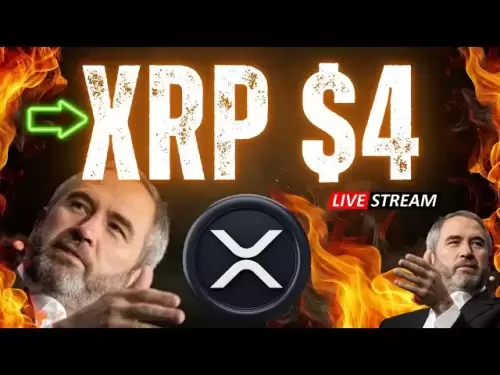-
 Bitcoin
Bitcoin $118100
-0.44% -
 Ethereum
Ethereum $3585
5.43% -
 XRP
XRP $3.434
5.65% -
 Tether USDt
Tether USDt $1.000
0.02% -
 BNB
BNB $743.8
3.89% -
 Solana
Solana $178.7
3.84% -
 USDC
USDC $1.000
0.03% -
 Dogecoin
Dogecoin $0.2381
12.81% -
 TRON
TRON $0.3270
3.62% -
 Cardano
Cardano $0.8315
4.93% -
 Hyperliquid
Hyperliquid $44.51
-4.42% -
 Stellar
Stellar $0.4710
1.52% -
 Sui
Sui $3.896
-2.51% -
 Chainlink
Chainlink $18.09
6.98% -
 Hedera
Hedera $0.2681
9.31% -
 Bitcoin Cash
Bitcoin Cash $516.7
4.83% -
 Avalanche
Avalanche $23.95
6.96% -
 Shiba Inu
Shiba Inu $0.00001490
5.67% -
 UNUS SED LEO
UNUS SED LEO $8.966
0.80% -
 Toncoin
Toncoin $3.294
4.39% -
 Litecoin
Litecoin $105.4
4.69% -
 Polkadot
Polkadot $4.356
5.30% -
 Uniswap
Uniswap $10.29
17.25% -
 Monero
Monero $327.9
-3.04% -
 Bitget Token
Bitget Token $4.942
4.33% -
 Ethena USDe
Ethena USDe $1.001
0.08% -
 Pepe
Pepe $0.00001348
2.17% -
 Dai
Dai $1.000
0.02% -
 Aave
Aave $320.8
0.58% -
 Bittensor
Bittensor $411.8
-4.07%
What happens to my investment if the ETH price crashes?
A significant ETH price crash can reduce investment value, impact staked rewards and DeFi positions, and trigger emotional responses, but long-term holders may benefit from historical recovery trends.
Jul 17, 2025 at 01:22 pm
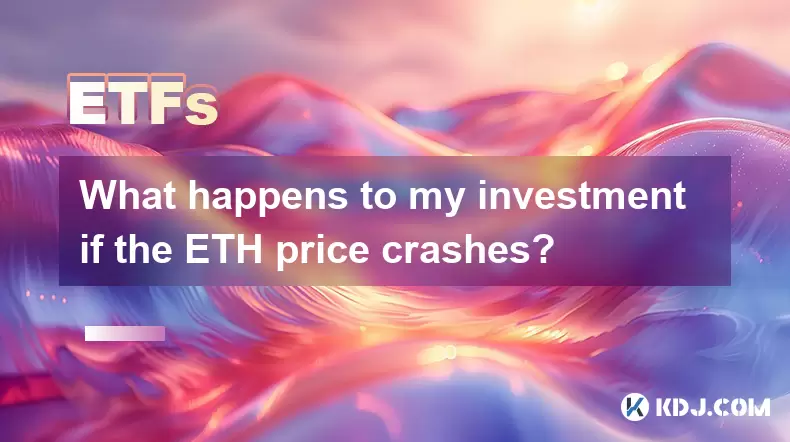
Understanding ETH Price Volatility
Ethereum (ETH) is one of the most widely traded cryptocurrencies, known for its high volatility. Price crashes are not uncommon in the crypto market due to various factors such as regulatory changes, macroeconomic conditions, and shifts in investor sentiment. When ETH's price drops significantly, it directly impacts the value of your investment.
If you hold ETH directly, the immediate effect of a crash is a reduction in the dollar or fiat value of your holdings. However, the underlying blockchain network and smart contract capabilities of Ethereum remain intact. This means that while the market value decreases, the utility and long-term potential of the asset aren't necessarily erased.
Impact on Staked ETH and DeFi Positions
Many investors stake their ETH to earn rewards through Proof-of-Stake (PoS) mechanisms introduced after The Merge. In the event of a price crash, the amount of ETH staked remains unchanged, but the fiat value of both principal and rewards declines.
For those participating in DeFi protocols, especially those involving collateralized loans or liquidity pools, a sharp drop in ETH’s price can trigger liquidation events. If your position uses ETH as collateral, a significant price drop may result in automatic liquidation if the loan-to-value ratio (LTV) exceeds safe thresholds.
- Monitor health factor on lending platforms like Aave or Compound
- Adjust positions by adding more collateral or repaying part of the loan
- Withdraw from high-risk pools during volatile periods
Tax Implications and Loss Realization
A decline in ETH’s price does not immediately trigger tax obligations unless you sell or dispose of the asset. In many jurisdictions, capital gains taxes apply only when you realize a gain or loss by converting ETH into fiat or another cryptocurrency.
If the price crashes and you decide to sell at a loss, this could be used strategically for tax-loss harvesting. By realizing the loss, you can offset capital gains from other investments and potentially reduce your taxable income.
However, holding onto the asset without selling means the loss remains unrealized, and no tax benefit is applied until a transaction occurs.
Psychological and Behavioral Responses
Market downturns often lead to emotional reactions such as panic selling or fear-driven decision-making. The psychological impact of a price crash can be significant, especially for new investors who may not have experienced major market corrections before.
It's important to distinguish between short-term volatility and long-term value. Holding through a crash can be a viable strategy if you believe in Ethereum’s fundamentals, including its role in decentralized finance, NFTs, and smart contracts.
Avoid making impulsive decisions based on short-term price movements. Instead, revisit your investment thesis and assess whether your original reasons for investing still hold true.
Diversification and Risk Mitigation Strategies
One way to protect against severe losses during an ETH price crash is through portfolio diversification. Holding multiple assets across different sectors—such as BTC, stablecoins, altcoins, and non-crypto investments—can help cushion the blow from any single asset’s decline.
Consider using stop-loss orders or automated trading tools to manage downside risk. These tools can help you exit positions automatically when prices fall below certain thresholds, limiting further exposure.
Additionally, maintaining a portion of your portfolio in stablecoins or cash equivalents allows you to take advantage of buying opportunities during market dips without needing external funds.
Frequently Asked Questions
Can I lose all my money if ETH crashes?
While a significant crash can severely reduce your investment’s value, complete loss is unlikely unless Ethereum’s network fails entirely or it becomes obsolete. Even during deep bear markets, ETH has historically recovered over time.
Should I sell ETH during a crash?
This depends on your investment goals and risk tolerance. Selling locks in losses, but holding may allow for recovery. Assess your financial situation and investment strategy before deciding.
How do I protect my ETH investment from crashes?
Use strategies like dollar-cost averaging, stop-loss orders, portfolio diversification, and avoid over-leveraging. Staying informed about market trends and project developments also helps.
Does ETH crash affect staking rewards?
No, the amount of ETH earned through staking remains unaffected, but the fiat value of those rewards decreases when the price drops.
Disclaimer:info@kdj.com
The information provided is not trading advice. kdj.com does not assume any responsibility for any investments made based on the information provided in this article. Cryptocurrencies are highly volatile and it is highly recommended that you invest with caution after thorough research!
If you believe that the content used on this website infringes your copyright, please contact us immediately (info@kdj.com) and we will delete it promptly.
- Meme Coin Mania: BONK, FLOKI, and the Quest for Crypto Gold
- 2025-07-19 10:50:12
- Troller Cat Presale Surge: The Meme Coin That's Actually Good?
- 2025-07-19 10:50:12
- XRP Mining for Passive Income: Is It the Next Big Thing?
- 2025-07-19 10:30:12
- Neo Blockchain & ChainGPT: AI Revolutionizing Decentralized Applications
- 2025-07-19 10:35:13
- Altcoins, Ethereum, and SharpLink: A New Era in Crypto Investment?
- 2025-07-19 09:15:12
- Coin Shop Homicide: Guilty Verdict After Decade-Long Wait
- 2025-07-19 08:50:13
Related knowledge
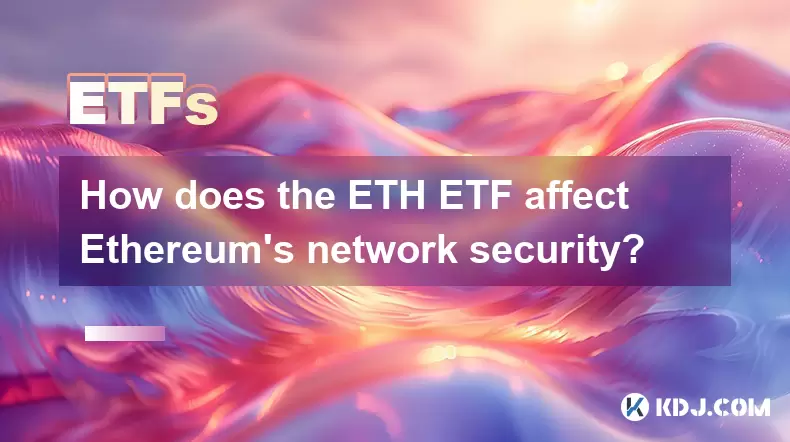
How does the ETH ETF affect Ethereum's network security?
Jul 17,2025 at 01:29pm
Understanding the ETH ETF ConceptAn Ethereum Exchange-Traded Fund (ETH ETF) is a financial product that allows investors to gain exposure to Ethereum ...
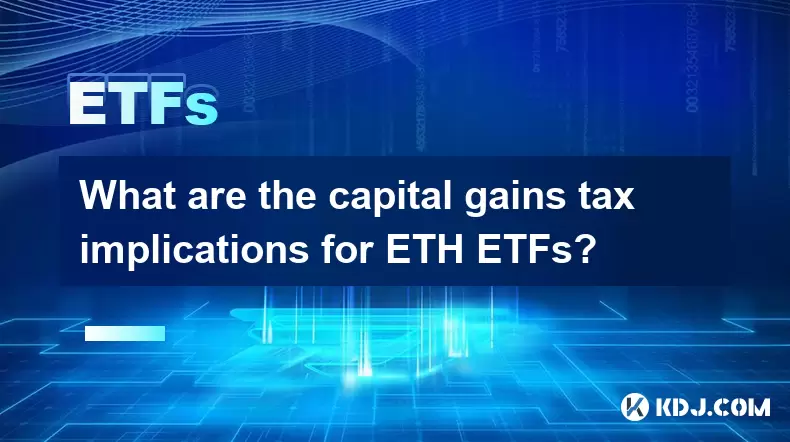
What are the capital gains tax implications for ETH ETFs?
Jul 18,2025 at 08:00am
Understanding Capital Gains Tax in Cryptocurrency InvestmentsCapital gains tax is a tax imposed on the profit realized from the sale of an asset that ...
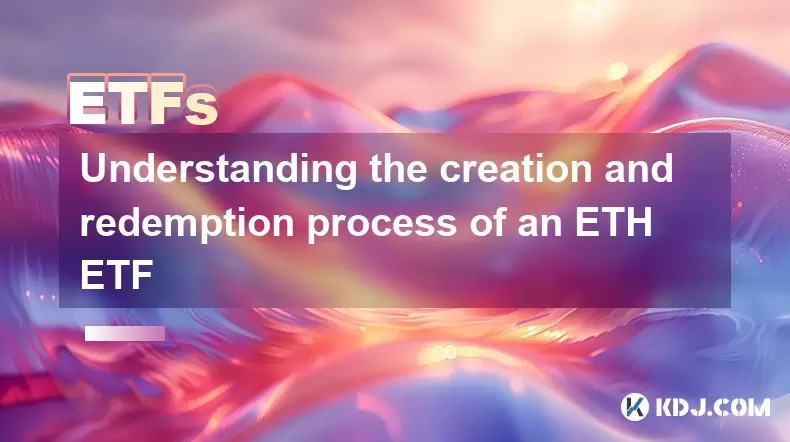
Understanding the creation and redemption process of an ETH ETF
Jul 19,2025 at 07:36am
What is an ETH ETF?An ETH ETF (Ethereum Exchange-Traded Fund) is a financial product designed to track the price of Ethereum without requiring investo...
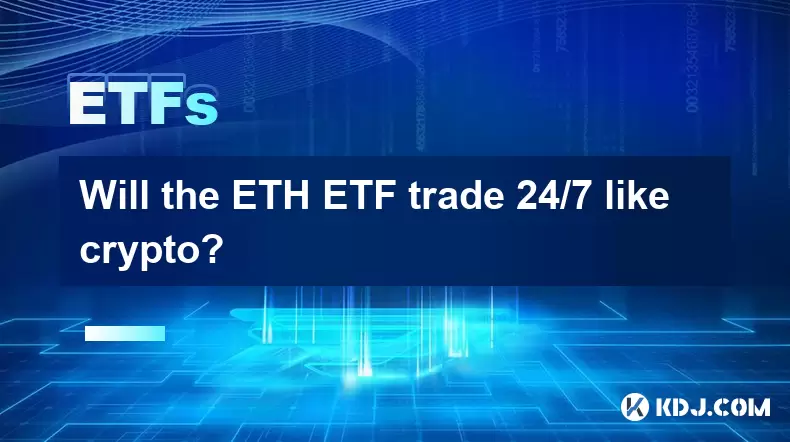
Will the ETH ETF trade 24/7 like crypto?
Jul 18,2025 at 10:00am
Understanding the ETH ETF and Its Trading HoursThe Ethereum Exchange-Traded Fund (ETH ETF) is a financial product that allows investors to gain exposu...
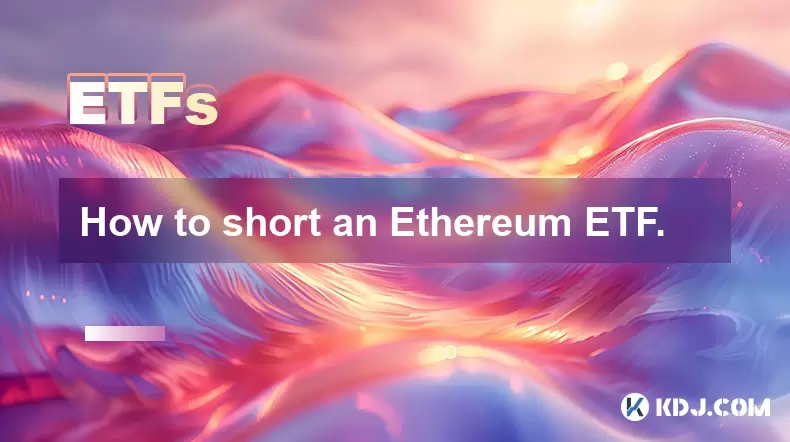
How to short an Ethereum ETF.
Jul 17,2025 at 05:43pm
Understanding the Concept of Shorting an Ethereum ETFShorting an Ethereum ETF involves betting against the price of Ethereum through a specific exchan...
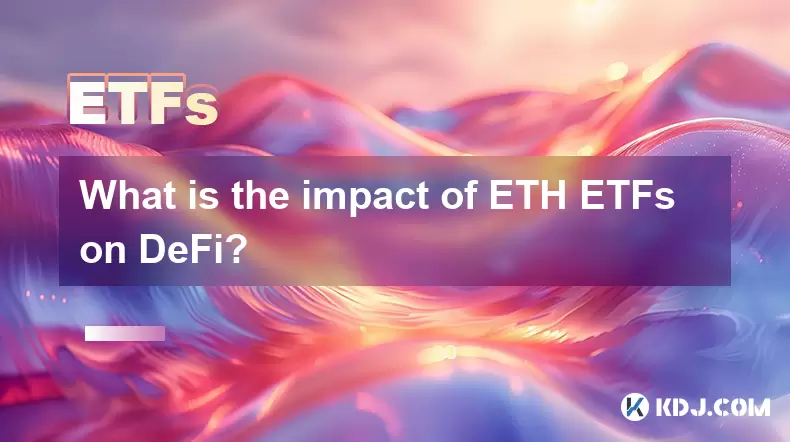
What is the impact of ETH ETFs on DeFi?
Jul 17,2025 at 11:07pm
Understanding ETH ETFs and Their Role in the Cryptocurrency MarketAn ETH ETF (Ethereum Exchange-Traded Fund) is a financial product that tracks the pr...

How does the ETH ETF affect Ethereum's network security?
Jul 17,2025 at 01:29pm
Understanding the ETH ETF ConceptAn Ethereum Exchange-Traded Fund (ETH ETF) is a financial product that allows investors to gain exposure to Ethereum ...

What are the capital gains tax implications for ETH ETFs?
Jul 18,2025 at 08:00am
Understanding Capital Gains Tax in Cryptocurrency InvestmentsCapital gains tax is a tax imposed on the profit realized from the sale of an asset that ...

Understanding the creation and redemption process of an ETH ETF
Jul 19,2025 at 07:36am
What is an ETH ETF?An ETH ETF (Ethereum Exchange-Traded Fund) is a financial product designed to track the price of Ethereum without requiring investo...

Will the ETH ETF trade 24/7 like crypto?
Jul 18,2025 at 10:00am
Understanding the ETH ETF and Its Trading HoursThe Ethereum Exchange-Traded Fund (ETH ETF) is a financial product that allows investors to gain exposu...

How to short an Ethereum ETF.
Jul 17,2025 at 05:43pm
Understanding the Concept of Shorting an Ethereum ETFShorting an Ethereum ETF involves betting against the price of Ethereum through a specific exchan...

What is the impact of ETH ETFs on DeFi?
Jul 17,2025 at 11:07pm
Understanding ETH ETFs and Their Role in the Cryptocurrency MarketAn ETH ETF (Ethereum Exchange-Traded Fund) is a financial product that tracks the pr...
See all articles

























